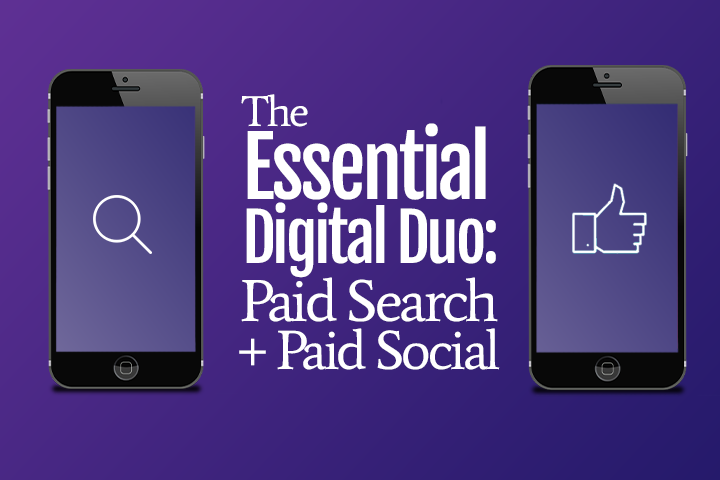The Essential Digital Duo: Paid Search + Paid Social

Developing a digital marketing strategy to align with your business objectives and produce sufficient results may seem like a long road to success - but it doesn't have to be. No matter the size of your advertising budget, it's important to note that different channels of digital marketing have their own unique benefits. Social media advertising and search engine marketing (SEM) are two of the most popular strategies in online marketing, but the most common questions is - is one better than the other? While each business has its own individual path to success on the web, there's no doubt that allocating budget spend to both paid search and paid social is essential. In traditional advertising, marketers don't just purchase ad space on one channel, they buy spots on radio, television and print. Integrating marketing strategies together to construct a mutually beneficial outcome helps save money, reach new audiences and ultimately increases the chance of a return on your investment. The first step is understanding the difference between social advertising and search engine marketing, and why you should be implementing both.
Social Media Advertising - Targeting Your Ideal Audience
Armed with layers of distinct targeting features including demographics, behaviors and interests - social media advertising allows you to create the ideal audience you want to reach. In 2016, 83% of marketers reported that they pursued a form of social media marketing. It's undeniable that the wide audience capabilities of social media platforms, and the ability to start a conversation within them, are incredibly useful for marketers to master. Social media advertising can take place on a wealth of platforms, including heavy hitters like LinkedIn, Facebook, Instagram, Twitter & more - each offering individual benefits and features catering to the needs of its marketer and the audience they are trying to reach. A special feature on the majority of social platforms is the ability to choose different objectives for a campaign; for example, a campaign on Facebook can be for increasing traffic, engagement, tracking conversions or even just garnering page likes. Social media is great for marketers with a variety of goals to meet because a lot can be accomplished with paid ads, in addition to the primary goal, due to organic reach increasing with others liking, commenting or sharing your paid content. Exposure and brand awareness are major advantages of showcasing ads to an audience on social media who may be interested, but have not yet sought out a brand or business.
Search Engine Marketing - Reaching The Audience Searching For You
Focusing on consumers searching for a specific need, paid search engine marketing offers high conversion value and close rates. Targeting keywords and phrases on platforms like Google and Bing allow for an intent-based method to online marketing, giving an audience exactly what they are searching for - you. A great benefit of search engine marketing is the positive influence it has on your search engine optimization efforts; if you optimize a web page for a keyword to increase your organic rankings, you can also use that page in your search advertising campaign. An optimized page will be seen as more relevant, and will potentially give your ads higher positions and a lower cost per click. Inversely, your ad campaign will be sending qualified traffic to your website. If your website is optimized for conversions, chances are greater that these visitors will then turn into customers. With 93% of online experiences starting with a search engine, advertising on a sophisticated platform, like Google Adwords, lets marketers focus on particular audiences already searching for their products or services.
The Perfect Pair
While the conversation of social media and SEM/SEO directly influencing each other's performance is still in discussion, there's no doubt that the individual return on each is important for a digital marketing campaign. Social media advertising showcases clickable content to a large, yet targeted audience providing awareness and traffic to brand content and messaging; paid search engine marketing is more specific, producing consistent (when done right), quality leads from a pool of people directly searching for a product, service or business. Why should you implement both strategies into a campaign? Limiting your online marketing to just one platform not only decreases your likelihood of lead generation, it limits your overall presence on the web. Potential leads and customers can be at all different stages of the buying cycle. A person may not be at the "right now" mindset, but with the proper pairing of paid search and social, your business will continuously be at the forefront of their digital activity. Even if your ad budget doesn't leave room for a huge campaign on Google and Facebook, there is always a method to utilize more than one platform! Celebrate the differences of social media advertising and search engine marketing, and include them both into your digital marketing campaigns. We promise they play well together.
No one business is the same, and neither should be their digital marketing strategies. While the confluence of paid search and paid social produces results for many, an individualized approach is necessary for your business. Deciphering the amount of budget, time and attention each medium needs to be successful requires strategy. At 360 PSG, we're able to drill down and create a unique plan to address the goals of your business and turn objectives into successes. Ready to get started?


